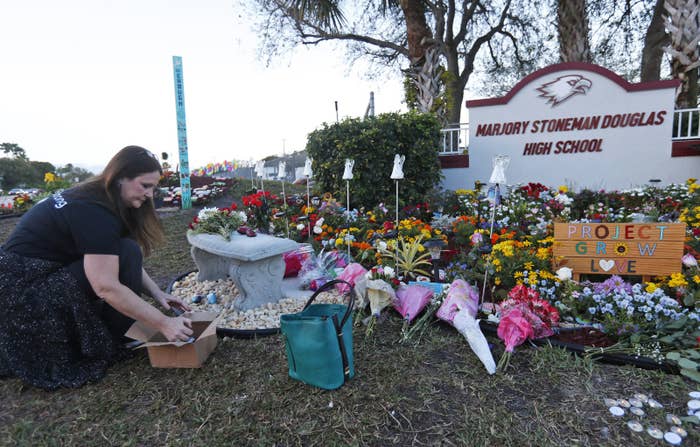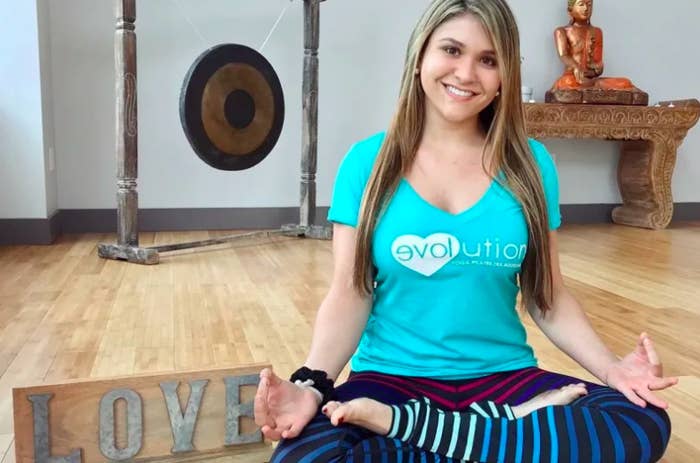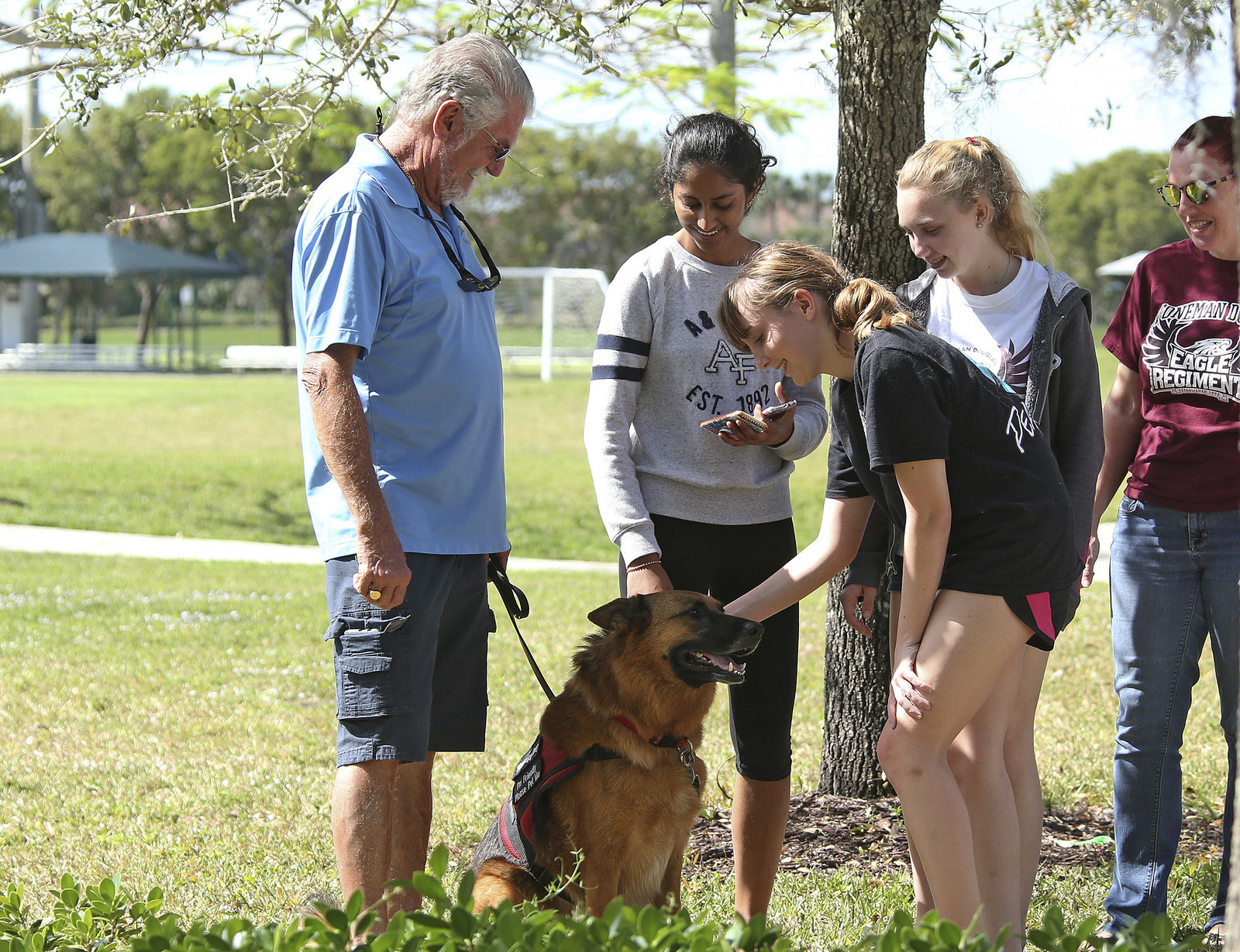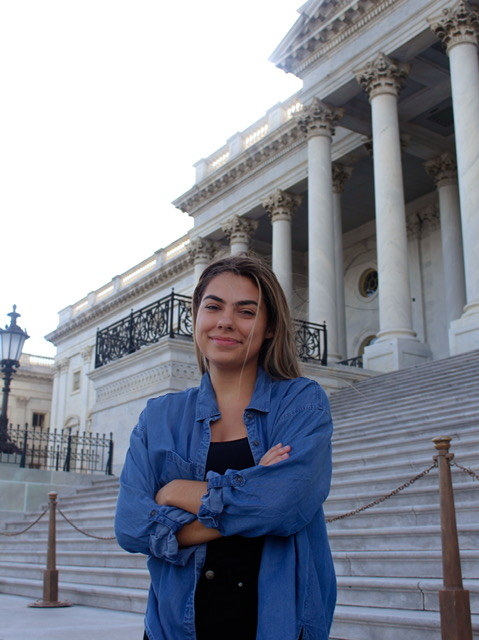
Two weeks after a gunman opened fire at Marjory Stoneman Douglas High School, killing 17 people on Feb. 14, 2018, students and survivors were back on campus, still struggling to process their trauma and grief.
Kyra Parrow, who was a senior at the time, recalled how she could barely write an assigned paper for class. Her teacher told her to put her grief in a box and complete it, Parrow said.
“This is an accurate description of how all survivors & students were treated by msd & Parkland,” Parrow, 19, said in tweets on Sunday. “Expected to brush aside our grief and deep mental wounds.”
“The passing of two survivors by suicide is a awake up call of yet again, another failure by America,” she added.
Parrow’s tweet came after a 17-year-old male Stoneman sophomore, who was at the school during the shooting, killed himself Saturday night. This was a day after the funeral of 19-year-old Sydney Aiello, a Stoneman graduate who was also at the school during the shooting, who killed herself March 17.

Aiello’s mother told CBS News that she had been diagnosed with PTSD and had survivor’s guilt. Neither authorities nor family members have said if the sophomore’s death was related to the mass shooting. Experts warn against focusing on a single reason to explain why someone might kill themself.
But after the deaths, several current and former Stoneman students on Twitter criticized the mental health resources they received after the shooting, with some saying they were told to push away their pain and grief. Their comments — in tweets and interviews with BuzzFeed News — echo beyond Parkland, and raise questions about how schools nationwide can better prepare for this reality.
Broward County School District Superintendent Robert Runcie tweeted about the two deaths Sunday and offered suicide prevention resources for students and parents, including services such as resiliency centers, crisis hotlines, and dialing #211. And several Broward County community members, including parents, county officials, and mental health professionals, met Sunday to discuss what they could do to help students at Stoneman cope with trauma and depression, Runcie said.
Meanwhile, Stoneman students and alumni tweeted the number “19” — adding the two recent deaths to the 17 victims of the shooting.
19. my heart breaks remember to check in on each other you never know what someone else faces
19. my heart breaks. we love you.
19 💔💔💔💔
Eden Hebron, a 16-year-old sophomore at the school whose friends knew the sophomore who died Saturday, told BuzzFeed News, “A lot of us didn’t get the care we needed and this is their last resort.”
“The fact that it has got to this point is heartbreaking,” said Hebron, who was hiding under a desk in a classroom in the freshman building when she saw bullets strike and kill her friend Alyssa Alhadeff.
Survivors and students said it had been difficult for them to return to campus two weeks after they had seen their friends and classmates die, and to pretend like things were normal.
“It was definitely difficult for us to pass by a crime scene on campus every single day,” Parrow told BuzzFeed News.
“We were expected to move on so fast,” Lex Michael, an 18-year-old alum, told BuzzFeed News. She tweeted Sunday, “When it comes down to it our trauma was quickly swept aside because they wanted everything to return to normal.”
In response to the criticism, a spokesperson for Broward County Public Schools directed BuzzFeed News to a full list of recovery and wellness efforts the district offered immediately after the shooting and in the months since.
The district opened five locations for the community to receive free mental health support, including a Broward County center staffed with full-time clinicians who provide “trauma-informed counseling services.” More than 25 mental health clinicians were staffed within the school zone along with therapy dogs, and two additional guidance counselors were added at the school. The school district said it engaged national experts on crisis bereavement and trauma to meet with parents of the victims and the injured students.
The school district said it has provided ongoing support, including 3,588 clinical hours to students and 217 clinical hours to staff at the school’s wellness center, as well as equipping 10th-graders with skills for future planning that would “help the student bounce back from adversity.”
School staff and clinicians were also trained in suicide prevention and trauma-focused behavioral therapy, the district said.

But the students said the school’s offerings didn’t feel adequate enough. After a couple of months, the therapy dogs went away. Two students told BuzzFeed News they didn’t think the grief counselors were enough for 3,200 students — and it was up to the students to seek them out for help.
Victoria Gonzalez, a student who lost her boyfriend, Joaquin Oliver, in the shooting and who knew Sydney Aiello, tweeted Sunday, “We need real help. No more half-assed effort for full blown trauma and depression.”
These kids need more. Not “trauma specialists” trained in 3 days. Not a hug from the suck ass principal. Not painted rocks or cards. We need real help. Real specialists. Real empaths. No more half-assed effort for full blown trauma and depression. This is what it does.
Gonzalez, 18, told BuzzFeed News that she knew Sydney and “it was apparent she was suffering.” But she “seemed to have blossomed into a beautiful person at the time of the suicide, which doesn’t make sense to many people, but it goes to show you never really know what someone is going through,” she said.
Gonzalez, who is a Stoneman senior, said that although there is a wellness center at the school filled with therapists from across the country, they are “most definitely not equipped to help the amount of students/faculty suffering the way we are.”
Many other students avoided visiting the grief counselors because of what they described as “compared trauma.”

Parrow, who was right outside the school when the shooting happened, said that she and many others she knew didn’t seek the help they needed because discussions on campus often made them feel like their trauma was less important than that of those who were in the building where the shooting took place.
Parrow didn’t know the sophomore who killed himself, but knew Aiello through mutual friends.
“Like if you weren’t even in the building during the massacre, don’t call yourself a survivor,” was one of the constant refrains Parrow recalled hearing from other students. “You don’t know what PTSD is,” was another she said.
Michael, who was home sick on the day of the shooting, said that people in her own community told her “there’s no way I could have ptsd and made me feel gross about even considering it and my experience was constantly invalidated.”
“We thought they had a good point,” Parrow said. “I shouldn’t go to therapy because I’m fine.”
Current and former Stoneman students tweeted over the weekend to express similar criticisms about available mental health services.
students are repeatedly told to "get over it, it's been a year" by staff members. we are told to push the grief and pain away so we can "focus" on school. this is what happens when the mental health of students isn't taken seriously and is pushed under a rug.
our friends need actual help. because the ‘just get over it’ rhetoric which has been forced upon us has done nothing to help the healing process. pushing normal so soon has buried the pain and the lack of professional support has been detrimental to mental health. i’m sorry 19 💔
Having students go back to the same high school 2 weeks after 17 teachers and students were killed is cruel and unusual punishment for living through a mass shooting.
Parrow said that the school should have sat down with the graduating class — the first since the shooting — and given students options and resources to help them after leaving Douglas.
“Once you are out of MSD, you’re on your own,” Parrow said. “Every day we’re in the dark about what we can do next.”
Following Sunday’s news about the sophomore’s death, around 50 Broward County community members — including parents, mental health professionals, and school and law enforcement officials — met to discuss how to provide the students and families the help they needed to prevent more deaths, the school district said.
Michael Udine, the commissioner of Broward County District 3, which covers Parkland, told BuzzFeed News that the goal of the meeting was to present a “cohesive message” to students and survivors to ensure them that there were people who they could talk to.
In light of the recent suicides, our community came together for an Emergency Response meeting to discuss how to provide the help needed to prevent tragedies like these. Parents, please talk to your children. Students, talk to each other. 👇👇👇👇👇 https://t.co/q4HVl7AZK9
District officials said a preliminary plan was created to help parents with tools to protect their children. “The first step was to develop a common message to cut through the clutter, so parents and youth have the same understanding about warning signs and where to turn for help,” the district said.
Responding to students who slammed the school district for not doing enough, Udine said that “obviously we need to do a better job at formatting the messaging and getting it out to the community.”
Udine said that two suicides in one week reinforced the need for students to know that resources are available to them.
Students said that after the two deaths, they are turning to one another for help.
“Because we’re in the sophomore class, we check in on each other and make sure we’re ok,” Hebron said. “A lot of us are worried about each other. Now that it’s happened, it’s reality.”
The students also said they hoped the deaths are a wake-up call to parents, school officials, and the rest of the country about the importance of mental health resources for survivors of mass shootings.
“It’s like losing someone who is you,” Parrow said. “Everyone sees themselves in these two students.”
The National Suicide Prevention Lifeline is 1-800-273-8255. Other international suicide helplines can be found at befrienders.org.
